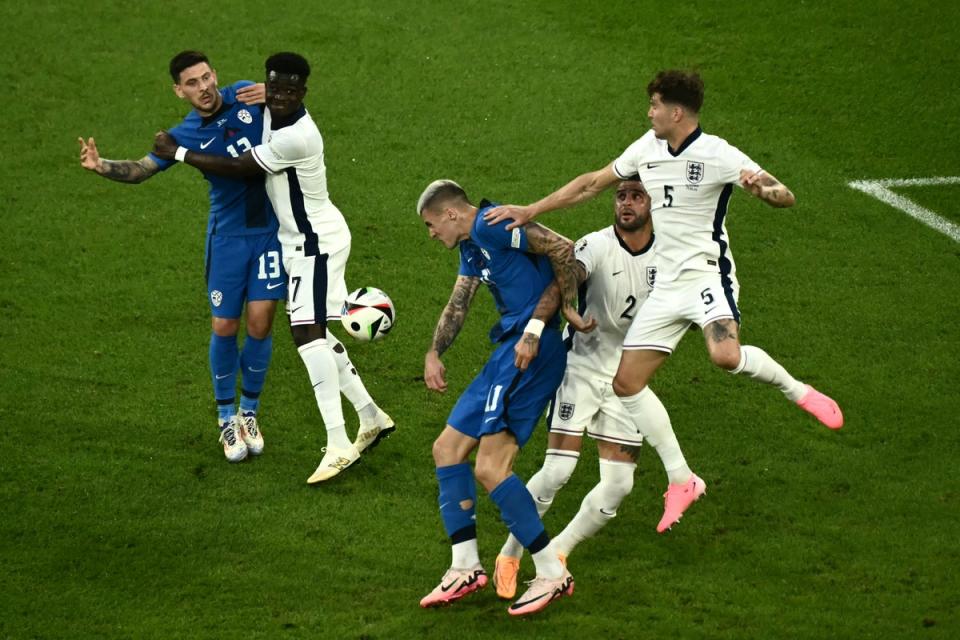Euro 2024: Sorry, Saka... England should put you at wing-back and play a back three

One familiar subplot to England’s deeply unconvincing European Championship campaign has been their erratic search for identity.
England have laboured through to Saturday’s quarter-final against Switzerland thanks to unadventurous opponents, a solid defence and a moment of iconic brilliance from boy-wonder Jude Bellingham, despite lacking an obvious structure or game-plan.
In three insipid group-stage performances and Sunday’s Bellingham-inspired last-16 win over Slovakia, England have appeared fundamentally confused about what kind of team they want to be: do they suffocate the opponent with possession like Spain? Or press high up and use fast transitions like the Austrians?
By the end of the win over Slovakia, they had abandoned any coherent approach beyond chucking the ball into the mixer and hoping for the best.
To be fair to Gareth Southgate, England’s lack of an ingrained national philosophy is a historic problem dating back to time immemorial.
Everyone knows how Spain, Brazil, Italy or the Netherlands are going to play, but what brand of football to expect from England, especially when the chips are down?
As Southgate considers how to fine-tune his side for this weekend’s meeting with the Swiss, perhaps England’s lack of an identity can work to the manager’s advantage. Something needs to change and Southgate is, at least, not straightjacketed by norms or tradition.

In the Netherlands, it is considered the highest sacrilege if the national team dares to stray from a 4-3-3 formation and its Cruyffian principles, but Southgate — while under enormous pressure to get England playing well — is not chained to any set style or formation.
England fans just want a team which sets pulses racing, whether with a modern pass-and-press approach or by playing 4-4-effing-2.
England are still a blank canvas, giving Southgate scope to shake his team from its stupor with small tweaks or more fundamental changes.
And the most obvious way that Southgate can restore balance and control to his hopelessly lopsided team is by switching to a back three.
Inexplicably, the England manager included only one, half-fit left-back in his Euros squad and Luke Shaw’s chances of returning from a hamstring injury in time to play a meaningful role in the tournament are now slim at best.
Every other defender in Southgate’s squad is right-footed, and watching Kieran Trippier deputise at left-back in Germany has been the most torturous aspect of England’s grim progress so far.
Southgate does, however, have a left-footer who is comfortable playing as a wing-back in Bukayo Saka. The Arsenal forward has long since outgrown the position, developing into a devastating right winger, and last week insisted that “putting me out of position is not the solution” to England’s problems.
With respect to Saka, it strikes me as a great solution. Maybe the only solution. It would not get the best from the 22-year-old but the switch to a three-man defence and wing-backs would immediately restore equilibrium to England, fixing Southgate’s self-inflicted left-sided problem.
The manager would not even have to change his XI from the Slovakia game, aside from replacing suspended centre-back Marc Guehi.
Trippier could move to right wing-back and Kyle Walker into the back three, while Bellingham and Phil Foden would be comfortable as twin No10s.
The England players know how the system works and there is no obvious downside
The England players know how the system works and there is no obvious downside, beyond irritating the mild-mannered Saka.
Playing 3-4-2-1 worked for Southgate’s England at the last European Championship, when they switched to the formation for the last-16 win over Germany and, less successfully, for the defeat to Italy in the final.
In fact, all of England’s most exciting modern teams at major tournaments — Italia ‘90, Euro ‘96, France ‘98, as well as 2018 and 2021 under Southgate — have played a variation of a back-three.
There is history there; tradition, even. So, maybe, insofar as England do have a national identity to fall back on when the going gets tough, a back three is it.

 Yahoo Sports
Yahoo Sports 
